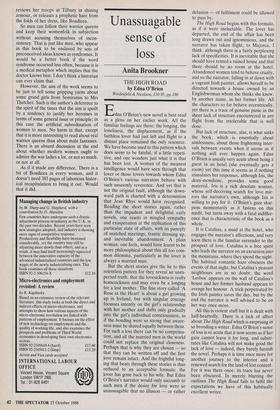Unassuagable sense of loss
Anita Brookner
THE HIGH ROAD by Edna O'Brien
Weidenfeld & Nicolson, L10.95, pp.180
Edna O'Brien's new novel is best read as a gloss on her earlier work. All the familiar feelings are there: the longing, the loneliness, the displacement, as if the faithless lover had just left and flight to a distant place remained the only resource. We have become used to this pattern which does seem to be fateful, if a little repeti- tive, and one wonders just what it is that has been lost. A woman of the meanest intelligence would have seen through that lover or those lovers towards whom Edna O'Brien's various narrators behave with such unseemly reverence. And yet that is not the original fault, although the down- ward path is charted with a determinism that Jean Rhys would have recognised. Reading the short stories again, rather than the impudent and delightful early novels, one reacts in mingled sympathy and exasperation at the replication of this particular state of affairs, with its panoply of snatched meetings, frantic dressing up, and inevitable abandonment. A plain woman, one feels, would have learnt to be more philosophical about this all too com- mon dilemma, particularly as the lover is always a married man.
But the short stories give the lie to this relentless pattern for they reveal an unex- pected truth: that the lovesickness is really homesickness and may even be a longing for a lost mother. The fine story called 'A Rose in the Heart' is about a girl growing up in Ireland, but with singular courage focusses intently on the girl's relationship with her mother and shifts only gradually into the girl's individual consciousness, as if the bonding were so strong that aware- ness must be shared equally between them. For such a loss there can be no compensa- tion, and all the married men in the world could not replace the original closeness. Perhaps that is why they are chosen — so that they can be written off and the first love remain intact. And the frightful long- ing that beats through these stories is thus reduced to an acceptable formula: the lover has gone back to his wife. But Edna O'Brien's narrator would only succumb to such men if the desire for love were so unassuagable that no illusion — or rather delusion — of fulfilment could be allowed to pass by.
The High Road begins with this formula, as if it were ineluctable. The lover has departed, the end of the affair has been long drawn out and ignominious, and the narrator has taken flight, to Majorca, I think, although there is a fairly perplexing lack of specificities. It is inevitable that she should have rented a ruined house and that there should be no room at the hotel. Abandoned women tend to behave crazily, and so the narrator, falling in at dawn with a vagrant Irish painter, allows herself to be directed towards a house owned by an Englishwoman whom she thinks she knew, by another name, in her former life. All the characters so far behave eccentrically, yet there is a trace of genuine panic in the sheer lack of structure encountered in any flight from the intolerable that is well done.
But lack of structure, alas, is what sinks the book, which is essentially about aimlessness, about those frightening inter- vals between events when it seems as if nothing will ever happen again. Edna O'Brien is usually very acute about being a guest in an hotel (she eventually gets a room) yet this time it seems as if nothing stimulates her responses, although Iris, the demi-mondaine, provides some good material. Iris is a rich desolate woman, whose self-deceiving search for love mir- rors the narrator's own, although Iris is willing to pay for it. O'Brien's gaze shar- pens momentarily as it fastens on this misfit, but turns away with a fatal indiffer- ence that is characteristic of the book as a whole.
It is Catalina, a maid at the hotel, who engages the narrator's affections, and very soon there is the familiar surrender to the prospect of love. Catalina is a free spirit who leads the narrator on an excursion into the mountains, where they spend the night. The habitual romantic haze obscures the events of that night, but Catalina's peasant neighbours are in no doubt: the word `Lesbos' appears on the wall of Catalina's house and her former husband appears to avenge her honour. A trick perpetrated by the Irish painter saves the day, but by the end the narrator is well advised to be on her way once more.
All this is violent stuff but it is dealt with half-heartedly. There is a lack of affect about The High Road which is surprising in so brooding a writer. Edna O'Brien's sense of loss is so acute that it now seems as if her gaze cannot leave it for long, and substi- tutes like Catalina will not make good the lack of love — indeed, they barely furnish the novel. Perhaps it is time once more for another journey to the interior and a renewed search for the land of lost content. For it was there once: its trace has never been obscured. In merely blurring the outlines The High Road fails to fulfil the expectations we have of this habitually excellent writer.


























































 Previous page
Previous page